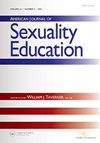Peer Educators as Partners in Sexual Health Programming: A Case Study
IF 1.1
Q2 EDUCATION & EDUCATIONAL RESEARCH
引用次数: 1
Abstract
Abstract The Sexual Health And Peer Education (SHAPE) program implemented in middle schools in Oklahoma County utilizes a hybrid adult and peer educator model to deliver sexual health programming. While peer educators have been incorporated into school-based sexual health programs in the past, this program is unique in its approach to preparing and engaging peer educators. Researchers synthesized data from interviews with program implementers and focus group discussions with teenage peer educators and middle school students who recently participated in the program to understand the process elements that contribute to the benefit of the SHAPE program model. Interviews with program implementers described the thorough peer educator recruitment and training process. Teenage peer educators felt well-prepared to deliver lessons, and through this program, they developed leadership skills, confidence, and grew personally. Middle school students revealed that peer educators were relatable and provided a positive experience where they could engage and ask questions. The application of a hybrid adult and teenage peer educator model proved useful for delivering sexual health topics and benefited students and teenage peer educators. This study’s findings highlight elements that can be utilized in future sexual health programming to prepare and engage teenage peer educators in more meaningful ways.作为性健康规划伙伴的同伴教育者:个案研究
摘要俄克拉荷马县中学实施的性健康和同伴教育(SHAPE)计划利用成人和同伴教育者的混合模式来提供性健康计划。虽然同伴教育者过去曾被纳入学校的性健康计划,但该计划在培养和吸引同伴教育者方面是独特的。研究人员综合了对项目实施者的采访以及与最近参加该项目的青少年同伴教育者和中学生的焦点小组讨论中的数据,以了解有助于SHAPE项目模型的过程要素。对项目实施者的访谈描述了同行教育工作者的全面招聘和培训过程。青少年同伴教育者觉得自己已经做好了授课的准备,通过这个项目,他们培养了领导技能、信心,并个人成长。中学生透露,同伴教育者是有关系的,并提供了一种积极的体验,他们可以参与其中并提出问题。事实证明,成人和青少年同伴教育者混合模式的应用有助于提供性健康主题,并使学生和青少年同伴性教育者受益。这项研究的发现强调了可以在未来的性健康规划中使用的元素,以更有意义的方式为青少年同伴教育者做好准备并让他们参与进来。
本文章由计算机程序翻译,如有差异,请以英文原文为准。
求助全文
约1分钟内获得全文
求助全文
来源期刊

American Journal of Sexuality Education
EDUCATION & EDUCATIONAL RESEARCH-
CiteScore
2.40
自引率
8.30%
发文量
39
期刊介绍:
The American Journal of Sexuality Education speaks directly to the distinct, professional needs of sexuality educators and trainers. This peer-reviewed journal provides sexuality educators and trainers with current research about sexuality education programming, best practices, sample lesson plans, reports on curriculum development and assessment, literature reviews, scholarly commentary, educational program reports, media reviews (books, videos, internet resources, and curricula), and letters to the editor. The American Journal of Sexuality Education addresses a variety of sexuality topics and audiences, presenting up-to-date theory and practice, lessons, and evaluations.
 求助内容:
求助内容: 应助结果提醒方式:
应助结果提醒方式:


